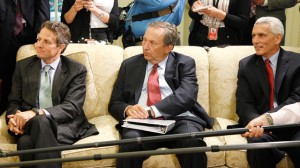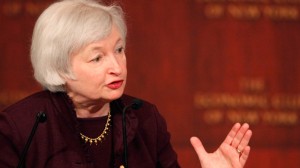
From left to right: Treasury Secretary Tim Geithner, National Economic Council Director Lawrence Summers, and Jared Bernstein, economic adviser to Vice President Joe Biden; listen as President Barack Obama meets with Federal Reserve Chairman Ben Bernanke in the Oval Office of the White House in Washington, Tuesday, June 29, 2010. (Photo by Charles Dharapak/AP)
“We should not oppose offshoring or outsourcing,” proclaimed a well-known economist at the 2011 World Business Process Outsourcing/Information Technology Outsourcing (BPO/ITO) Forum. Hundreds of corporate executives sat in on this economist’s lecture, including representatives from Morgan Stanley, JPMorgan, Deustche Bank, Pfizer, Coca Cola and other major businesses. The economist went on to proclaim that critics of outsourcing were like “Luddites who took axes to machinery early in England’s industrial revolution.”
This economist was not a Heritage Foundation scholar or Ayn Rand Institute fellow. The speaker that June was none other than Lawrence Summers, who had just finished up his role as director of the White House National Economic Council, where he was President Obama’s top economic adviser.
While working for the anti-corruption blog Republic Report last year, I reached out to conference organizer Kartik Kilachand to ask him about the speaking fee Summers was given and why his full remarks were never posted to the website (only a snippet was published). Kilachand replied that this was “confidential information” because the conference had signed a non-disclosure agreement with Summers that concealed both his full remarks and speaking fee. I also made a query to Julie Shample, Summers’s assistant at Harvard. “I wouldn’t have any information about this, you may want to check with the forum,” replied Shample.
This practice of giving private paid speeches to big corporations was nothing new for Summers. Before joining the Obama administration, he received hundreds of thousands of dollars in speaking fees from financial institutions that the White House was involved in bailing out and then shielding from more intense regulation. For Summers, the speech at the outsourcing conference was simply a relapse.
All of this is particularly relevant now that Summers is being vetted as a possible chairman of the Federal Reserve, the most important economic post in the world. If Summers is still taking big payments to speak favorably towards the world’s biggest corporations, Americans and their representatives in Congress should know about it. But Summers is under no legal requirement to disclose his most recent payments from corporations until he is officially nominated, and if he’s nominated, he’ll most likely be confirmed. No Federal Reserve nominee has ever been defeated, with Ben Bernanke coming the closest when 30 senators voted against confirming him for a second term.
Summers is not the only possible nominee with corporate conflicts of interest. Another name being floated is former Treasury Secretary Tim Geithner. Geithner, too, has used his time out of government to enrich himself, at least partly from corporate largesse. After leaving his post in January 2013, Geithner got $200,000 to speak at a Deutsche Bank conference, and $100,000 from investment banking firm Blackstone and private equity firm Warburg Pincus. Blackstone and Deutsche Bank have both been in the news for their efforts to “create and sell the first bond backed by home-rental payments,” which the Wall Street Journal warns would be “more risky than well-known securities” but would satisfy “investors…hungry for the high returns.”
This isn’t to say that Geithner and Summers will necessarily do the bidding of outsourcers or mega-banks. Both men have a history of center-right policy advocacy, and it’s likely that they’re simply ideologically aligned with corporate America. But their habit of floating in and out of government while taking in six-figure payments from large corporations gives them a powerful incentive to continue to line up their beliefs with those of their benefactors. As Upton Sinclair famously wrote, “It is difficult to get a man to understand something, when his salary depends on his not understanding it.”

Janet Yellen, vice chairwoman of the Federal Reserve Bank, speaks at the Economic Club of New York in 2011. (Photo by Mark Lennihan/AP)
By comparison, the third likely nominee for the spot, current Federal Reserve Vice Chair Janet Yellen, has few financial ties to big corporations. Her most recent financial disclosure form discloses no payments from outside corporations in recent history, although she does list a payment towards an iPhone, an iPad and a sterling silver plate she received as parting gifts from the Federal Reserve Bank of San Francisco – which altogether have a worth of $1,300 (it has been noted that her husband, George Akerlof, a Nobel Prize winner, has had numerous paid speaking engagements over the years). She also reportedly has the support of one-third of Senate Democrats, who sent a letter to Obama urging him to appoint her.
Despite the lack of conflicts of interest, Yellen has earned the support of many on Wall Street, thanks to the perception that she would continue the easy monetary policies of her predecessor. But having a record relatively free of cash payments from special interests would allow Yellen to make these decisions with the sort of independence Geithner and Summers are unlikely to have.
The real problem is that while Yellen’s status as a senior government employee mandates that she publicly disclose her current finances, Geithner and Summers are under no such requirement until they are actually nominated. This means that as Obama mulls over who he’ll nominate — who will likely be easily confirmed if history is any judge — the public will lack the knowledge necessary to judge the various potential nominees. Like the text of Summers’s speech to the outsourcers that day, his financial records and those of Tim Geithner’s are undisclosed.


